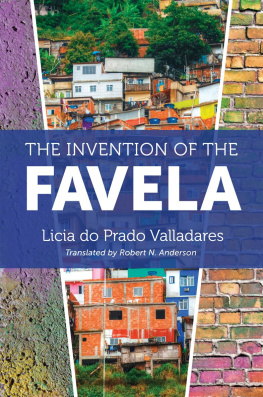THE INVENTION OF THE FAVELA
A book in the series
LATIN AMERICA IN TRANSLATION / EN TRADUCCIN / EM TRADUO
This book was sponsored by the Consortium in Latin American and Caribbean Studies at the University of North Carolina at Chapel Hill and Duke University.
THE INVENTION OF THE FAVELA
Licia do Prado Valladares
Translated by Robert N. Anderson
THE UNIVERSITY OF NORTH CAROLINA PRESS
Chapel Hill
Translation of the books in the series Latin America in Translation / en Traduccin / em Traduo, a collaboration between the Consortium in Latin American and Caribbean Studies at the University of North Carolina at Chapel Hill and Duke University and the university presses of the University of North Carolina and Duke, is supported by a grant from the Andrew W. Mellon Foundation.
2019 The University of North Carolina Press
All rights reserved
Designed by Jamison Cockerham
Set in Arno, Scala Sans, and Museo by Tseng Information Systems, Inc.
Manufactured in the United States of America
The University of North Carolina Press has been a member of the Green Press Initiative since 2003.
Cover illustrations: concrete wall iStockphoto.com/Andrei Berezovskii; brick wall iStockphoto.com/Dmitrich; buildings iStockphoto.com/Lindrik
Originally published in Portuguese by Editora FGV, Rio de Janeiro, Brazil, with the title A inveno da favela: Do mito de origem a favela.com, 2005 Licia do Prado Valladares.
LIBRARY OF CONGRESS CATALOGING-IN-PUBLICATION DATA
Names: Valladares, Licia do Prado, author. | Anderson, Robert Nelson, translator.
Title: The invention of the favela / Licia do Prado Valladares ; translated by Robert N. Anderson.
Other titles: Inveno da favela. English | Latin America in translation/en traduccin/em traduo.
Description: Chapel Hill : The University of North Carolina Press, [2019] | Series: Latin America in translation/en traduccin/em traduo | Translation of: A inveno da favela : do mito de origem a favela.com. Rio de Janeiro : Editora FGV, 2005.
Identifiers: LCCN 2018052926 | ISBN 9781469649979 (cloth: alk. paper) | ISBN 9781469649986 (pbk.: alk. paper) | ISBN 9781469649993 (ebook)
Subjects: LCSH: SlumsBrazilRio de JaneiroHistory. | Rio de Janeiro (Brazil)Social conditions. | PoorBrazilRio de Janeiro.
Classification: LCC HV4075.R53 V3513 2019 | DDC 305.5/69098153dc23 LC record available at https://lccn.loc.gov/2018052926
To
GIZELLA DO PRADO VALLADARES,
a great woman!
(IN MEMORIAM)
Contents
Figures, Graphs, and Map
FIGURES
GRAPHS
MAP
Foreword: Deciphering the Favela
This book by Licia Valladares is probably the broadest and most systematic study yet published on the phenomenon of the favela. Since she was a young university student, Valladares has investigated the issue of housing among the popular social classes in Brazil. From there, she has undertaken a series of studies, and many of her works have become basic references for all fields of the social sciences. Sociologists, anthropologists, political scientists, economists, urban planners, architects, social workers, journalists, and others have benefited from and dialogued with this body of work of international resonance.
The Invention of the Favela observes and analyzes the evolution of the favela as a category of social problem and as a problem for her field of study. The result is a work that is truly historical and archeological in its review of images, stereotypes, prejudices, and common places as well as a review of various actors attempts to overcome these. This book provides an exhaustive and stimulating survey of more than a century of denunciations, critiques, polemics, and efforts to find solutions for this dramatic dimension of Brazilian societys process of urbanization. Although Rio de Janeiro is the main focus of the work, Valladares also seeks to understand aspectsparticularly striking onesof Brazilian society as a whole.
It is worth highlighting her Herculean effort to include most everything relevant that has been written about the topic of the favela, both by academics and by writers of public policy. It therefore constitutes an invaluable exercise in the sociology of sociology and in the history of ideas and social policy. It is also worth pointing out the breadth of her academic references, both in theoretical terms and in terms of the research itself. This book not only treats these issues generally but also presents vividly the activity of institutions and the trajectory of individuals who had significant roles in this complex process of identification, construction, and analysis of a tense, conflictual area of study and political debate.
This book is already a landmark in the history of social sciences in Brazil. Its importance pushes our boundaries, to the extent that it raises questions of great importance for the analysis of urban life and its dilemmas in the contemporary world. It is a valuable contribution to the study of the living conditions of the poorer social classes and their relationships with other classes and with public and private institutions. Its critical dimension stands out in the face of the ongoing social crisis that we in Brazil have been living through for decades. All of this is presented in a clear, objective style accessible to diverse segments of the reading public.
Gilberto Velho (19452012)
Preface to the English-Language Edition
Most everybody has an idea of a favela nowadays. Successful movies, from Black Orpheus to City of God, have shown them to international audiences. Newspapers like the New York Times, Le Monde, and El Pas regularly publish articles about them. There are Favela Chic restaurants and nightclubs in London, Paris, and Tokyo. The favelas of Rio are announced in international tourist guides, from Lonely Planet to its French equivalent, the Guide du routard. In Rio, favela tours pick up visitors in all major hotels. Several favelas with a nice view have hostels, many have restaurants, and there is even a gastronomic guide to the favelas. One can even take a virtual tour of major favelas on the Internet, using Google Maps and Google Street View. Many websites and blogs offer images and information about them.
The favela has become an internationally established, attractive representation of poverty. It exposes otherness (poverty, Brazil) in a pleasant and exotic setting (weather, landscape), with a tinge of danger and adventure (violence, drug traffic prowling around), but with positivity and creativity (music, community, warm social relations, collective mobilizations).
The purpose of this book is to show that this image of the favela is not the simple straightforward reflection of a social reality but the outcome of a long process of production and diffusion of representations of the favelas by the media, policy makers, experts, social scientists, and community and nongovernmental organization (NGO) activists. Students from around the world rush to the favela dreaming they will find some form of social innocence within the city, like the anthropologist discovering a forgotten tribe deep in the Amazon forest. They should be aware that thousands of students, researchers, NGO activists, and journalists have been there before; that hundreds of books, PhD dissertations, and academic articles have been written and published; that all these writings, and media headlines and articles, and politicians discourses, and public policy statements, and programs have contributed to shape the favela as a problem and the everyday representations they will be collecting.











